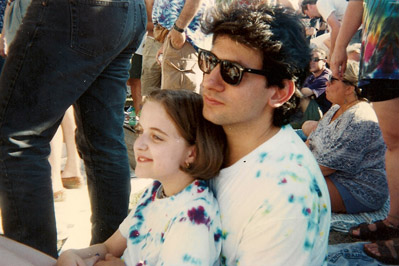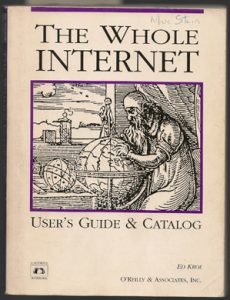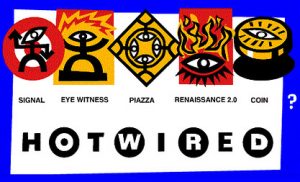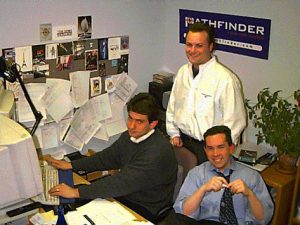
(This is chapter ten of my ongoing memoir of the Internet industry.)
On June 7 1995 I reported for my first day at Time Inc. New Media, in the basement of the Exxon Building at 1251 Avenue of the Americas. This was the tech basement, a spillover from the Time-Life Building across the street. Things felt hectic as soon as I stepped into this basement, and I noticed that several new employees had joined in the weeks between my interview and my first day. Pathfinder was growing fast.
Pathfinder was the most aggressive new media venture taking place in New York City in the summer of 1995, and it was all happening under the direction of Jerry Levin, the celebrated mastermind behind Home Box Office and now the CEO of Time Warner. Time Warner had been founded only four years earlier as the merger of a New York magazine company and a Hollywood film studio, but Time Warner’s real buried treasure was HBO, which had been Jerry Levin’s baby, and that’s why he was now CEO of the whole operation. And Pathfinder was Jerry Levin’s new baby, so there were high expectations for this project at the time I joined.
Maybe that’s why I found the atmosphere in the basement at 1251 Avenue of the Americas a little thick soon after my arrival there. People were working long hours, and they had red rings around their eyes and looked grumpy. On my first day, Oliver Knowlton asked me if I could work Saturday. I hated working Saturday, hated missing a day with the family and a day to read and rest, but of course I had to join “the team” as they attempted to add a new web server to the straining server farm. This staff was driven.
It had been a long time since I’d worked any overtime on Wall Street. It was going to be a lot less cushy over here.
My first job was to work with Shad Todd on a Major League Baseball scores update for an experimental Pathfinder service called My News. I had been brought in to coach the department on relational database architecture, SQL and Sybase, so I showed Shad how we could display the desired screens with three simple SQL tables:
LEAGUE
league_id | league_name
TEAM
team_id | league_id | team_city | team_name | team_nickname
GAME
game_id | game_date | home_team_id | visitor_team_id | home_team_score | visitor_team_score | number_innings
Shad then wrote the Perl script to display the data, and we had a successful service up and running. This felt good, and I was really excited to continue to pursue the potential of SQL databases in web publishing.
Unfortunately, I was about to be directed to a different task. As I was enjoying my first small achievement with the baseball score system, I felt a cold hand around my shoulder. Oliver asked me into his office. “We’d like you to start working on some problems with the advertising system”, he said.
This was not what I wanted to work on at Pathfinder. I wanted to work on content publishing, personalized content, advanced display paradigms. I would later learn to appreciate the power of web advertising, but in 1995 the crass and flashy banner ads that cluttered web pages seemed to be nothing but a nuisance. I knew that Pathfinder would have to bring in revenue, but I was hoping we’d succeed with syndication or subscription models rather than advertising.
But Pathfinder’s only business model in 1995 was advertising, and they needed a relational database to manage the rotations and schedules (which wasn’t very hard) as well as the unique ad views and click-throughs (which was very hard, because it meant churning through ginormous log files of unstructured text). Once I saw the log files — Pathfinder was very popular in 1995, and these daily log files were so large that they regularly crashed our web servers — I realized this would be a Sisyphian task.
I hated this. It killed me that I had been chosen for this responsibility only because my Sybase experience qualified me for it, which meant I had to miss out on the fun stuff that the younger and less qualified techies were doing: the Major League Baseball stuff, the Batman movie stuff, the Vibe Magazine stuff (Vibe Magazine was by far the coolest thing in the Time Inc. stable in 1995). But I had no choice. Oliver introduced me to a dapper and bowtied young man named Eduardo Samame, director of business operations for Time Inc. New Media, and I knew it’d be a long time before I built any more baseball databases.
After two hard weeks at Pathfinder I planned a jaunt to two double Bob Dylan and the Grateful Dead concerts at Giants Stadium in New Jersey. I’d always been a Dylan freak, but an unreasonable number of my online friends were committed Deadheads — Christian Crumlish, Dan Levy, Steve Silberman, David Gans, Nick Meriwether — and I just loved the hilarious, obsessive and very clever conversations that took place on rec.music.gdead, especially during touring season. This would be my first chance to participate in the online Grateful Dead “social network”, and I was pretty geeked out about the whole thing.
So was my nine-year-old daughter Elizabeth, who had also become a junior Deadhead after repeated hearings of Reckoning and Without A Net (two great live albums) on our living room stereo. The first of the two Dylan/Dead concerts were on Father’s Day, June 18, so it seemed like a good idea to take Elizabeth with me.
I don’t think Bob Dylan’s understated opening set made much of an impression on her, but she definitely loved the parking lot scene, and we were then treated to a sparkling, energetic show that opened with Bob Weir’s “Feel Like A Stranger”, closed the first set with “Deal”, opened the second set with “China Cat Sunflower->I Know You Rider” and “Eyes of the World” and also featured a somewhat confused Jerry performance on “Wharf Rat” and a surprise encore of “Lucy in the Sky With Diamonds”. I’m glad Elizabeth got to see a good show.
The next concert was a Monday night, so I went straight from work, joining Dan Levy and a wiry short-haired friend of his named Chris on the bus line at Port Authority. Chatting with Chris about Dylan lyrics and other matters, we discovered that we’d both been in rock bands. Except mine had sucked, had existed only in my basement, and broke up after nine months, whereas Chris’s, it turned out, had been the Spin Doctors. I hadn’t recognized Chris Barron (a singer I liked a lot) without his scraggly hair and beard. This is what it was like going to Dead shows with Dan Levy.
The second Grateful Dead show opened with “Cold Rain and Snow” and featured a very rare performance of one of my favorite Dead songs, “Unbroken Chain”. I was very moved and considered it a good omen of things to come. The final big Jerry closer was “Stella Blue”, which was less shaky than “Wharf Rat” the night before, and the last song they played was “Brokedown Palace”.
Things were moving very fast on the Internet by the summer of 1995. A new language called Java had been introduced in March, and by the summer it began to gain critical mindshare among Internet developers like me. I was a C++ expert going many years back, but I was excited to see a language with a bulletproof memory model and guaranteed platform independence. C++ was a hacker’s paradise, but Java was secure enough for the Internet. Awareness of Java began to ripple through the software development community in the summer of 1995, and I wrote my own first Java program, a “nervous text” thing, just for fun, during that summer’s vacation.
Bill Gates, the hero of Wall Street for his enduring Microsoft empire, made statements during the summer of 1995 that indicated a sudden shift in Microsoft’s business strategy to face what Gates called the “Internet tidal wave”. Because Gates was so highly regarded in the investment community, this was a big endorsement. Ironically, Microsoft was already committed to a not-quite Internet ready new operating system, Windows 95, which was scheduled for August 24. Gates now announced that Microsoft planned to launch something called MSN, an online service obviously designed to compete with America Online and Compuserve, on that same date.
In July 1995, a former Wall Street trader named Jeff Bezos quietly launched an online bookstore called Amazon.com. This was the first widely successful e-commerce site.
On August 9, 1995, ten-month old Netscape corporation had a very successful initial public offering on Wall Street, despite the fact that it gave away its core product, the Mozilla browser, for free. Priced at $14, Netscape’s stock ran up to $75 a share in its first day. Thus began a five-year slow-boiling hysteria known as the dot-com stock boom.
It was at this point that everything started to go crazy in the Internet business. When future historians seek to identify the moment the Internet phenomenon exploded, the moment it became clear this technology would change the nature of our lives, I am sure they will settle on the summer of 1995. Suddenly all the pieces were in place. Java turned web servers into powerful information engines. Microsoft promised to bring the Internet into everybody’s home. Amazon’s success proved that people will buy things online, and Netscape’s huge IPO proved that investors will buy dot-com stocks.
Suddenly the circuit was complete.
I heard about the big Netscape IPO early on the dramatic morning of August 9, 1995, and then in the early afternoon of that day I heard that Jerry Garcia had died. I could only think of Elizabeth, because this day was her tenth birthday. Naturally she’d heard the news — not of Netscape’s IPO, of course, but of Jerry’s death — and was in tears. Meg brought her (and Daniel and Abby, and Meg’s parents who were visiting from out of town) to Strawberry Fields in Central Park that night so we could sit around the “Imagine” mosaic and light candles for Jerry. The next day, Jerry’s death was all over Pathfinder’s front page.

While all this crazy stuff was going on all summer, I was going around gluing “Queensboro Ballads” posters on mailboxes and lampposts around New York City. I’d always wanted to be a poster artist — this is the honest truth — and I placed dozens of these posters around Greenwich Village, the East Village, the West Village, Soho and Tribeca. I avoided midtown. The 11×17 posters featured a photo of me walking home from Shea Stadium with my son Daniel. Looking back today, I’m not sure what I was thinking when I came up with this poster idea, and it seems amazing that I never got arrested.

The posters did get noticed, though, and I was very gratified that several bookstores including the Gotham Book Mart kept the poster up for a long time. I felt good about the way “Queensboro Ballads” had been received, and I did consider it one of the best things I’d ever done, but at the same time I was disappointed that most people still thought of me as the “LitKicks guy” or the “Beat Generation guy”. The new project was a little too abstract, and fewer readers cared about it.
Still, the “Ballads” got a very nice write-up by Richard Gehr in the Village Voice, and that made me feel great.

The summer of 1995 would have suited Heraclitus: it was a summer of constant change. It was hard to keep up with everything that was changing. For instance, now I was wearing t-shirts and jeans instead of dress shirts and ties to work. But it had happened so fast, I’d forgotten to even enjoy the change.
A general hysteria seemed to sweep the software development industry around this time. It’s a funny thing that in June of that year several of my Sybase colleagues told me (especially at the tail end of my drunken farewell party at a midtown steak club) that they thought I was insane to leave booming Wall Street for a frivolous Internet start up in midtown.
By the end of August, they all knew I’d placed the right bet by joining a dot-com. All they had to do was read the Wall Street Journal. Big money had arrived in little Silicon Alley, and now the Internet was really hot, and getting hotter.






15 Responses
feels like it was frikkin
feels like it was frikkin 1895 … nice screen shot of the frames around the ads — lots of memories / discussions.
Angela! YOU WERE THERE!
Angela! YOU WERE THERE!
I’ve really been enjoying
I’ve really been enjoying these “internet memoir” posts, Levi. Hope you keep them going!
I remember 1995 as the “year
I remember 1995 as the “year of the ISP” as people scrambled to open up service provider businesses in their basements and garages. I loved the cultish, weird, art meets commerce feel of the early web, where the first to make consistent big money were porno sites. I think Netscape was the company that brought the web to the masses (and made Bill Gates wake up).
Michael – I did some work for
Michael – I did some work for a search-engine company a few years ago; according to them, porn is still the biggest thing on the web – by a huge margin. The bane of their existence is trying to keep their porn filters one step ahead of the skin industry (and failing, of course).
I spy good pics, good
I spy good pics, good narrative, a long strange trip, a prescient Zen statement, “It’s not about money.”
Angela, I like your interview with Stacy Horn!
O.K. Levi, here’s a question
O.K. Levi, here’s a question I’ve always wanted to ask you: You are a techie and a geek using the Internet to write about books and literature instead of babbling endlessly about video games and how they are better than books and movies and how you love Hideo Kojima and why oh why there is not a sequel for The Misadventures of Tron Bonne or some crap like that.
How do you do it to remain sane and intelligent? I love you (in a manly totally not a stalker kind of way).
Love the VV clipping! Keep it
Love the VV clipping! Keep it up!
I love it! I wish we were on
I love it! I wish we were on the bus to the Meadowlands right now!
This memoir seems subtly
This memoir seems subtly driven not so much by look at what happened but by there’s something enigmatic coming next.
Something around the corner.
Something curious to the narrator. But something slightly ominous. The narration unfolds not with incredulousness (this is not a criticism as most incredulousness sucks), and not even uncertainty, but with a voice that suggests something dark could happen.
Proust did it. Most Americans don’t get the nuance because they don’t understand the French. As a people or a language.
But Proust can be an observer who never quite steps out of the shadows as events around him swirl.
This backdrop is played out juxtaposed against a voice that is more boylike, anxious; wants the Internet to be the ultimate trip tripping lights fantastic, but the boy is reticent; almost seems afraid that his dive into the netherworld might evaporate on him, disappear, the word I am looking for here is BETRAYAL.
It’s as if the narrator is from time to time looking over his shoulder to see what might be nipping at his heels, and at the same time he’s telling us about events that have slipped away, but he’s not quite sure where they went, all of which makes the future slightly menacing.
The narrator seems conflicted. We are not sure why. But illumination seems forthcoming.
This is what gives the thing nuance. It’s NOT a monotone. I have no idea why most people write in monotone but they do. This is light years from that. The problem with this kind of writing is tricky because at some point it will unexpectedly become art.
It happens and you can get enormous pleasure from having done it. And then you realize that this one small section you have just turned into art sets the stage. The work behind you will need a new commitment. The work in front of you will need an extraordinary focus. Damned if you do. Damned if you don’t.
The strength is in the voice as it weaves. Hold onto that. It is far more fluid than the history of the Internet and it holds the reader even as it expands its own vision of what it can do.
The muscle flexes.
The fact that it grows in complexity before our very eyes is cause for w-o-w. I can’t think of too many things on the Internet that cause me to come back again. But this does. I like the internal play between the family man and provider who interact with the boy who pokes at the digital world with some kind of magic wand he has made from his chemistry set. He’s not quite sure the whole thing isn’t going to suddenly explode and betray him.
http://le-too.blogspot.com — Tim Barrus, Amsterdam
“My first job was to work …
“My first job was to work … on a Major League Baseball scores update”
You are a saint and unsung hero of the age.
________
The photo of you also looks like photos I’ve seen of Richard Hell.
_________
The Village Voice got Queensboros Ballads right. I was really impressed by it way back when. It was a right way to use the web to make literature in a way that integrated web ability to link and floow and integrate pictures and text.
And most importantly the content was good. It was fun!
myspaces and the like are really pre-packed templates for the masses to do something like it.
Barrus, nice assessment of
Barrus, nice assessment of the narrator in the work so far, “from time to time looking over his shoulder to see what might be nipping at his heels”. And yes, you’re right, the writing is nuanced. Very perceptive, I must say. We are witnessing the growth of a techie geek into a man of letters.
Awesome.
Awesome.
well done, glad i’m along for
well done, glad i’m along for the ride.
got the jeff goldblum goin’
got the jeff goldblum goin’ on